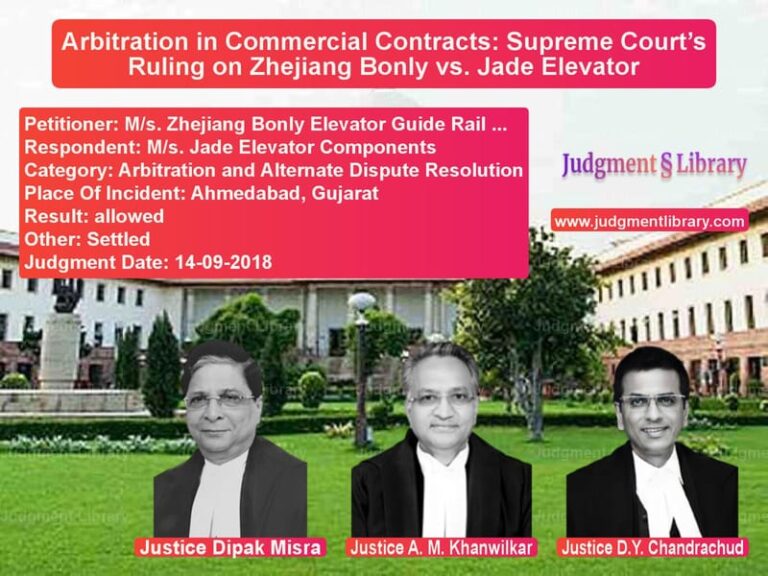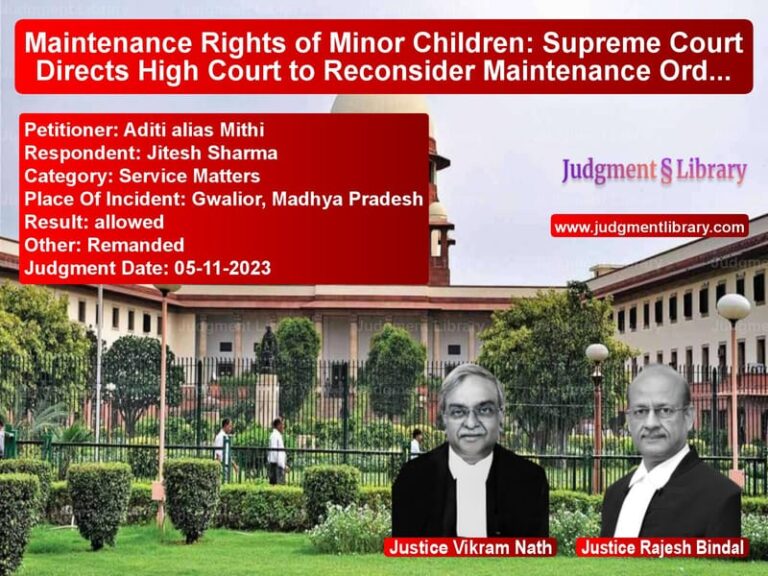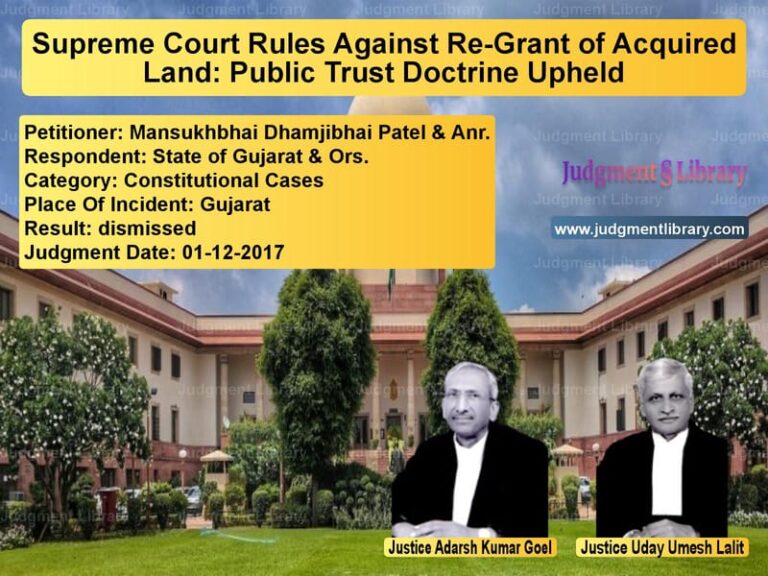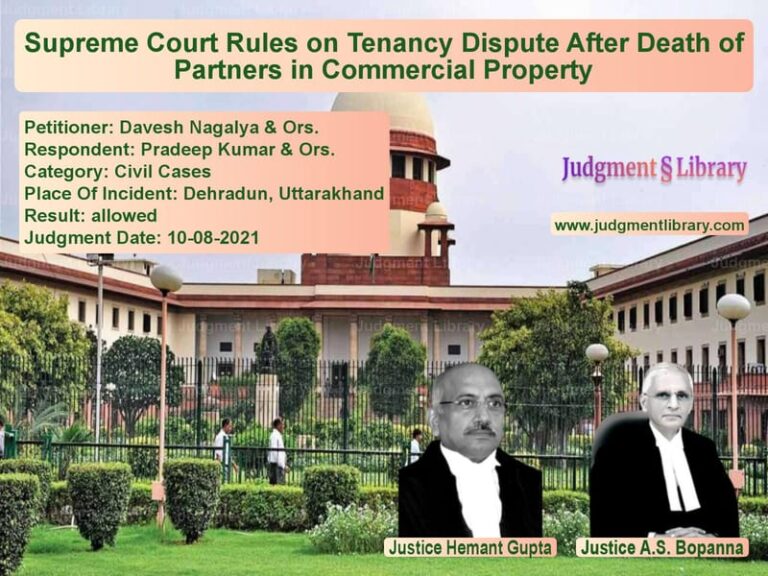Land Acquisition Dispute: Supreme Court Restores Petition for Reconsideration
The case of Krishan Chander & Anr. v. State of Haryana & Ors. pertains to a land acquisition dispute where the appellants sought the release of their land from acquisition, arguing that it had remained unutilized. The Supreme Court examined the legality of the acquisition process and the government’s policies regarding the release of unused land.
The appellants approached the Supreme Court after their writ petition was dismissed by the Punjab and Haryana High Court without an in-depth examination of their claims. The Supreme Court found that the High Court had failed to conduct a thorough review of the matter and directed that the petition be reconsidered.
Background and Key Issues
The dispute arose when the State of Haryana issued notifications under the Land Acquisition Act, 1894, to acquire land in Village Para, District Rohtak, for the development of Sector 36. The appellants, claiming ownership of 16 kanals of land, argued that:
- The acquired land had not been utilized for the intended public purpose.
- Other similarly situated landowners had received exemptions from acquisition.
- The land should be released in accordance with state policies on unused acquisitions.
Arguments of the Appellants (Krishan Chander & Anr.)
The appellants argued that:
- Their land was not used for the designated public purpose, despite the passage of several years.
- The government had released portions of other similarly situated land but denied them the same relief.
- They remained in possession of the land, as shown by revenue records and site photographs.
- The High Court, in a prior ruling, had acknowledged that acquiring land beyond the necessary requirement was against public interest.
- The government had a policy of releasing unutilized land, and their case should have been considered under this policy.
Arguments of the Respondents (State of Haryana & Ors.)
The government contended that:
- The acquired land was planned for institutional use, green belts, and parking areas as part of the Sector 36 layout.
- The appellants did not file objections under Section 5-A of the Land Acquisition Act, which is a prerequisite for seeking deletion.
- The land had been legally acquired, and possession was taken under the ‘Rapat Roznamcha’ (a government record).
- The state had already developed residential plots in the area, and releasing the appellants’ land would disrupt planned urban development.
Supreme Court’s Observations
The Supreme Court found that the High Court had dismissed the writ petition without adequately examining the issues. The Court observed:
“The writ petition was dismissed at the threshold without directing notice to the respondents and considering the grievance of the appellants in the backdrop of the contention urged.”
The Supreme Court also emphasized that:
- The High Court had previously directed the state government to assess whether the land was needed for public purposes.
- The competent authority had acknowledged that the land was still vacant but justified its retention based on the layout plan.
- The government’s reasoning for retaining the land required deeper scrutiny, especially in light of past exemptions granted to other landowners.
1. Legality of the Acquisition
The Court noted that while land acquisitions serve public purposes, the government must ensure fairness and proportionality. The appellants’ claim that similarly situated landowners had been granted exemptions required verification.
2. Possession and Usage of Land
The respondents claimed that possession was taken via the ‘Rapat Roznamcha,’ but the appellants contended that they remained in control of the land. The Supreme Court stated that the High Court should have reviewed official records and site conditions to determine actual possession and usage.
3. Policy on Release of Land
The Court found that the state had a policy allowing the release of unutilized land but had not applied it uniformly. The Supreme Court cited past rulings where landowners in similar situations had their lands released.
4. Need for Further Inquiry
“In the backdrop of such contentions, the High Court should have secured the records and considered whether possession had been validly taken and whether similarly situated landowners had been treated differently.”
The Court concluded that the High Court’s failure to conduct a detailed examination warranted a fresh hearing.
Final Judgment
The Supreme Court set aside the High Court’s order and restored the writ petition for reconsideration:
- The High Court must reexamine whether the land was genuinely required for public use.
- The government must justify why the appellants’ land was retained while other lands were released.
- The petitioners must be given a fair hearing and an opportunity to present their case.
Impact of the Judgment
The ruling reinforces several key legal principles:
- Equal treatment in land acquisition: Governments cannot selectively retain some lands while releasing others without justification.
- Proper scrutiny of land use: Courts must verify whether acquired land is truly needed for public purposes.
- Fair hearing for landowners: The judiciary must ensure due process in land acquisition disputes.
- Transparency in acquisition policies: Authorities must consistently apply policies on land release.
This judgment ensures that landowners facing acquisition disputes receive fair consideration and prevents arbitrary retention of unused land.
Petitioner Name: Krishan Chander & Anr..Respondent Name: State of Haryana & Ors..Judgment By: Justice R. Banumathi, Justice A.S. Bopanna.Place Of Incident: Rohtak, Haryana.Judgment Date: 17-09-2019.
Don’t miss out on the full details! Download the complete judgment in PDF format below and gain valuable insights instantly!
Download Judgment: Krishan Chander & An vs State of Haryana & O Supreme Court of India Judgment Dated 17-09-2019.pdf
Direct Downlaod Judgment: Direct downlaod this Judgment
See all petitions in Property Disputes
See all petitions in Landlord-Tenant Disputes
See all petitions in Judgment by R. Banumathi
See all petitions in Judgment by A. S. Bopanna
See all petitions in allowed
See all petitions in Remanded
See all petitions in supreme court of India judgments September 2019
See all petitions in 2019 judgments
See all posts in Civil Cases Category
See all allowed petitions in Civil Cases Category
See all Dismissed petitions in Civil Cases Category
See all partially allowed petitions in Civil Cases Category







